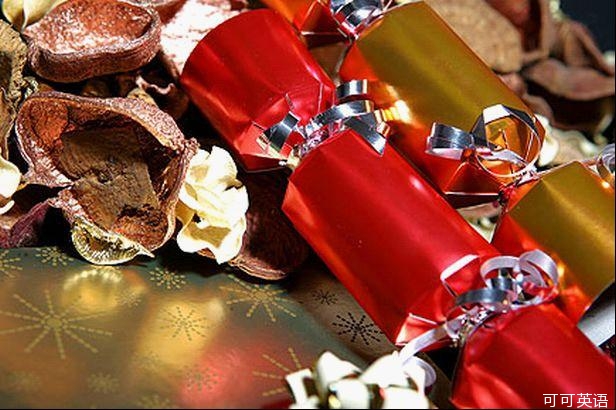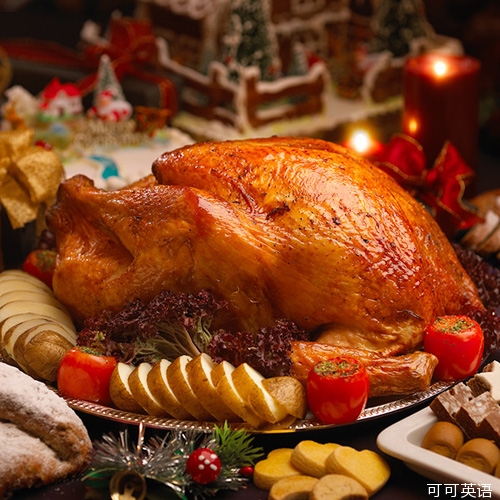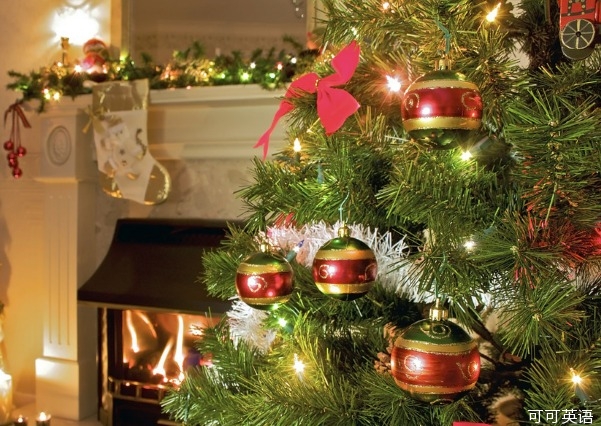(单词翻译:单击)

They’re the essential bits of Christmas. Squeezing a fir tree into your living room. Eating an odd-looking bird. Welcoming an intruder who breaks in by coming down the chimney. Gazing at your fifth mince pie of the day and finally wondering what on Earth might be in it.
他们,是圣诞节最核心的部分。让一棵冷杉树挤满你小小的起居室;吃一个外形奇怪的鸟兽;欢迎一个从烟囱闯进你家的“入侵者”;盯着第五块咸肉饼,好奇里面究竟会有些什么。
How many of us stop to think how it all began? Let’s have a look where our festive traditions come from.
有多少人会停下来想自己为什么要这样做?你真的懂圣诞吗?现在就来验证一下吧。

Father Christmas
圣诞老人
Red robes, white beard, waist-slapping jollity and booming ho-ho-hos. He’s been around for ever, hasn’t he?
身穿红色长袍,面长白色长胡,欢乐地拍打自己胖胖的腰部,发出“呵呵呵”的声音,他就是一直以这种形象陪伴我们成长,不是吗?
Actually only since 1935, when Haddon Sundblo, a Madison Avenue advertising man, created Santa Claus for a Coca-Cola campaign.
直到1935年,麦德逊大道(美国广告业中心)的广告人Haddon Sundblo为了可口可乐运动创造了圣诞老人。
In previous lives he was thinner and paler, a character based on a 4th Century Asian bishop called Nicholas, who became the patron saint of children in most of Europe.
先前他效仿四世纪一个叫的Nicholas亚洲主教,把自己弄得既瘦又苍白。在欧洲大部分地方,孩子们都把这位主教看成是自己的保护神。
It was in Holland, where they called him Sinterklaas, that he earned his reputation for giving stuff away. A small pair of wooden shoes would be left by the fireplace and he would fill them with sweets.
在荷兰,因为他经常派礼物给人们,赢得了不少名誉,人们称他为圣尼古拉。如果人们在火炉旁放置一对小小的木鞋子,他就会把它们塞满糖果。
What about Rudolph the red-nosed reindeer? Debt-ridden shopworker Robert Mays invented him in 1947 as the hero of a bestselling book that made him a fortune.
那红鼻子驯鹿鲁道夫又是怎么来的?负债累累的店员Robert Mays在1947年创造了它作为畅销书的主角,因此赢得了丰厚的回报。

Crackers
饼干
The mastermind behind the Christmas cracker was a London sweetshop owner called Tom Smith. In 1847, after spotting French bonbons wrapped in paper with a twist at each end, he started selling similar sweets with a “love motto” inside.
想出圣诞饼干的才人是伦敦一间糖果店的店主Tom Smith。在1847年,他发现法国小糖果用一张纸把两边扭着包裹,他也开始售卖相类似的糖果,并在里面放有“爱的誓言”。
They were so popular as a Christmas novelty that Tom made them bigger and included a trinket. But the real flash of inspiration came when he poked the fire and a log exploded with a sharp CRACK! That gave him the idea for a package that went off with a bang.
作为圣诞节新奇的小礼物,这种包装的糖果十分受欢迎,于是Tom把糖果制造得更大,里面可以放一个小饰品。但是真正激发他灵感的是,当他戳破炉火引起一块木头爆炸而发出的巨大的声音。这让他想到可以把袋子爆破引起响声。
He launched his “Bangs of Expectation” with top-of-the range gifts such as jewellery, ivory carvings, perfume and miniature dolls.
于是,他发射了名为“期望爆炸号”的超级有分量的大礼品,如珠宝、象牙雕刻、香水和微型玩偶。

Turkey
火鸡
Goose was the popular choice for Christmas dinners for generations. Middle-class families with lots of relatives might go for a boar’s head, while the seriously rich showed off with a swan.
鹅是每个年代很受欢迎的圣诞节晚餐料理。中级家庭会和亲戚们共享野猪头,而最有钱的家庭会用天鹅来炫耀。
The turkey didn’t arrive until the 1600s, when merchants brought it back from America and marketed it as an exciting new festive taste – if you stuffed it with sage and onions and laced it with cranberries.
直到17世纪,火鸡才呈现在大家眼前,是由商人们从美洲带回来的,并推销其成为让人心动的新的节日美食——如果你把它填满鼠尾草和洋葱,并用蔓越莓把它围起来。

The tree
圣诞树
So who DID suggest cutting down a huge piece of shrubbery, dragging it into the house, covering it with lights, then sticking a model fairy on top? Then leaving it there until it drops needles all over the floor.
到底是谁建议砍掉一棵参天巨树,然后把它拖进房子,挂满节日灯,并在树顶插上一个精灵模型,又任由它的针叶掉满地上而不管?
Blame a German. The Romans had hung up the odd bit of green branch, but it was evangelist Martin Luther from Saxony who first decorated a whole fir tree.
要怪就怪德国人吧。是罗马人开始挂起这种奇怪的绿色树木的,但萨克森州的福音传道者才是装饰起冷杉树的第一人。
That was in 1510. The idea finally spread to Britain during Queen Victoria’s reign when her German-born husband Prince Albert had one sent over to remind him of his own childhood Christmases.
在1510年,这个主意传到了维多利亚女王统治的英国。有人送了一棵圣诞树给女王的丈夫—出生于德国的Albert王子,以唤起他对童年圣诞节的回忆。
Cards
圣诞卡
The first were sent in 1843 by Sir Henry Cole, boss of the Victoria and Albert Museum. He was far too busy to write letters so had an artist design 1,000 cards, illustrated with a festive family scene on the front and printed with the greeting, “A Merry Christmas and a Happy New Year to You”.Horrified at being caught out, all his friends sent him one back the next year.
第一封圣诞卡是1843年由维多利亚和阿尔伯特博物馆(世界上最大的装饰艺术和设计博物馆)的老板Henry Cole先生发出的。他由于工作太繁忙而没空写祝贺信,于是他请了艺术家设计1000份贺卡,在卡片首页画有家庭节日相聚的场景,然后印刷带有“祝你圣诞节快乐和新年快乐”的祝福语。由于怕被发现没回信,他的所有朋友都在下一年送回他一张卡片。
In 1880 cards became so popular.
1880年,圣诞卡开始普及。
Tinsel
金灿灿的装饰
The first mass-produced Christmas decoration, it was made in Europe in the 1600s from sheets of silver alloy hammered until they were paper-thin and cut into strips.
第一批大量制造的圣诞节装饰,是在17世纪在欧洲制造的,把银合金片不断捶打直到变成薄片,然后切割成条。
The idea was to reflect the light from candles and fireplaces. Problem – after a few Christmases, the silver turned black. A cheaper, throwaway tinsel made from aluminium-based paper swept the festive market in the 1950s. Problem – it went up like a flash when it caught fire.
这些装饰是为了反射蜡烛和火炉的光亮,营造温馨气氛。问题——在圣诞节一系列活动后,银条会变黑。一种更便宜的,可丢弃的装饰条使用铝做的,在20世纪50年代横扫节日饰品市场。问题——如果遇火它会像闪电一样爆发。


